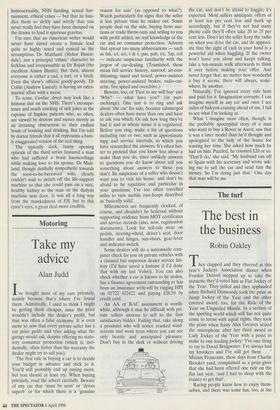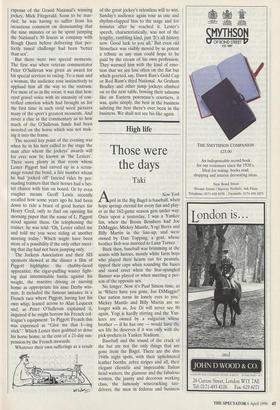The turf
The best in the business
Robin Oakley
They clapped and they cheered at this year's Jockeys Association dinner when Frankie Dettori stepped up to take the statuette they'd voted him as Flat Jockey of the Year. They yelled and they applauded when Richard Dunwoody took the prize as Jump Jockey of the Year and the other coveted award, too, for the Ride of the Year on Unguided Missile. In a section of the sporting world which still has not quite come to terms with equal rights, they took the point when feisty Alex Greaves seized the microphone after her third award as Lady Jockey of the Year with a point to make to one leading jockey: 'I've one thing to say to David Bridgwater: I've always had my knockers and I've still got them . . . ' Miriam Francome, these days from Charlie Brooks's yard, complained as a prize-giver that she had been offered one ride on the flat last year, 'and I had to sleep with the trainer to get that'.
Racing people know how to enjoy them- selves, and there was some fun, too, at the expense of the Grand National's winning jockey, Mick Fitzgerald. Soon to be mar- ried, he was having to suffer from his incautious comment on dismounting that the nine minutes or so he spent jumping the National's 30 fences in company with Rough Quest before delivering that per- fectly timed challenge had been 'better than sex'.
But there were two special moments. The first was when veteran commentator Peter O'Sullevan was given an award for his special services to racing. To a man and a woman, the audience rose instinctively to applaud him all the way to the rostrum. For most of us in the room, it was that hon- eyed gravel voice with its intensity of con- trolled emotion which had brought us for the first time in such vivid word pictures many of the sport's greatest moments. And never a clue in the commentary as to how much of the O'Sullevan funds had been invested on the horse which was not mak- ing it into the frame.
The second key point of the evening was when he in his turn called to the stage the man after whom the jockeys' awards will for ever now be known as 'the Lesters'. There were plenty in that room whom Lester Piggott had carved up in a scrim- mage round the bend, a fair number whom he had 'jacked off fancied rides by per- suading trainers that their horses had a bet- ter chance with him on board. Or by even rougher means. Geoff Lewis recently recalled how some years ago he had been down to ride a brace of good horses for Henry Cecil, only to find on opening his morning paper that the name of L. Piggott stood against them. On telephoning the trainer, he was told: 'Oh, Lester called me and told me you were riding at another meeting today.' Which might have been more of a possibility if the only other meet- ing that day had not been jumping only.
The Jockeys Association and their SIS sponsors showed at the dinner a film of Piggott highlights: the chubby-faced apprentice, the cigar-puffing waster fight- ing that interminable battle against his weight, the maestro driving or nursing home as appropriate his nine Derby win- ners. It included the famous instance in a French race where Piggott, having lost his own whip, leaned across to Alan Lequeux and, as Peter O'Sullevan explained it, inquired if he might borrow his French col- league's equipment: 'In Piggott French this was expressed as "Give me that f—ing stick".' Which Lester then grabbed to drive his horse home, at the cost of a 21-day sus- pension by the French stewards. Whatever their own sufferings as a result of the great jockey's relentless will to win, Sunday's audience again rose as one and rhythm-clapped him to the stage and for minutes after he reached it. Lester's speech, characteristically, was not of the lengthy, rambling kind, just 'It's all history now. Good luck to you all.' But even old Stoneface was visibly moved by as potent a tribute as any man could hope to be paid by the cream of his own profession. They warmed him with the kind of emo- tion that we see less often on the flat but which greeted, say, Dawn Run's Gold Cup or Red Rum's third National. As Graham Bradley and other jump jockeys climbed on to the next table, bowing their salaams like an Eastern potentate's courtiers, it was, quite simply, the best in the business saluting the best there's ever been in the business. We shall not see his like again.



























































 Previous page
Previous page